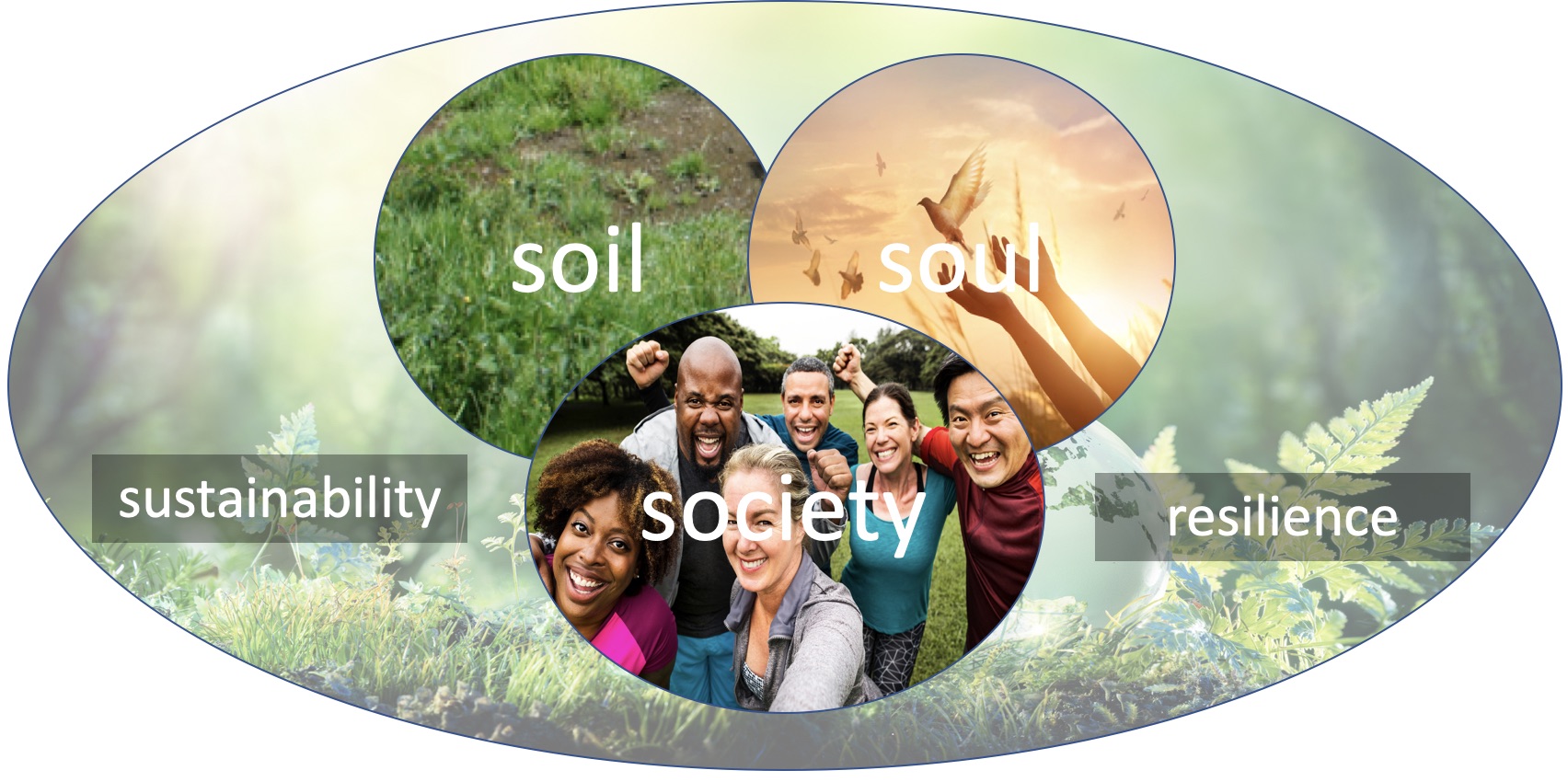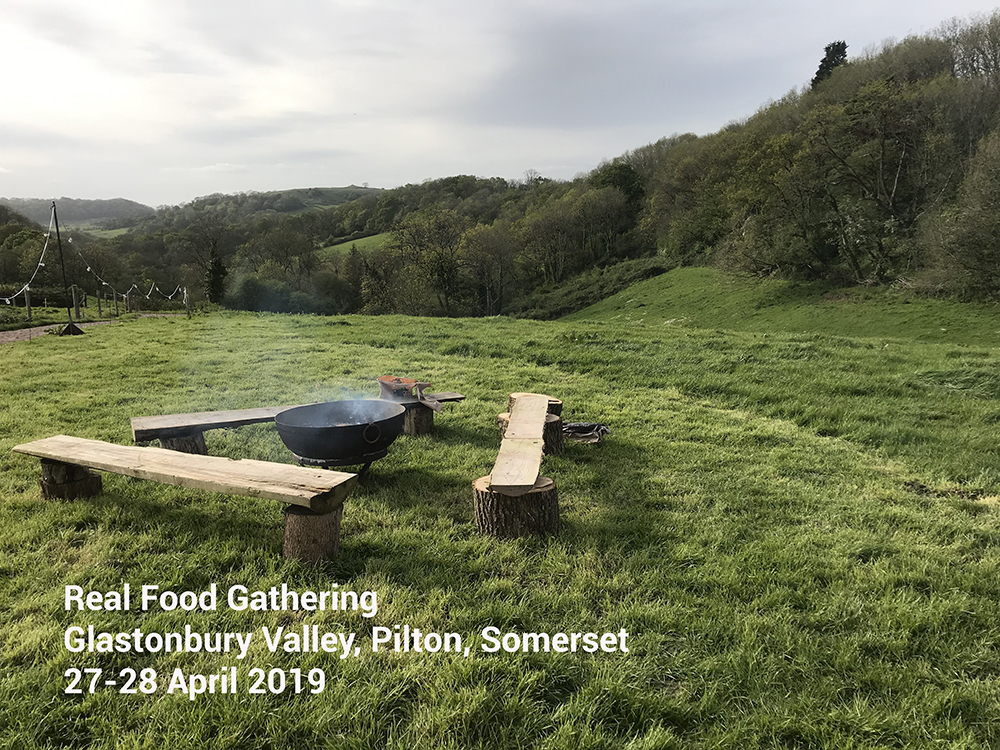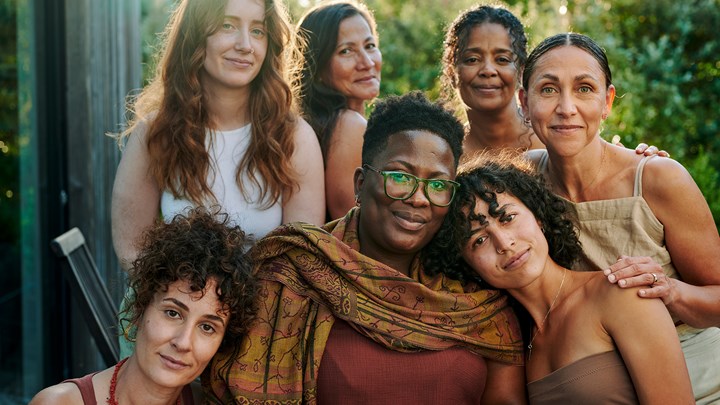Content Sections
By Meleni Aldridge, executive coordinator
A marquee in the wilds of Glastonbury Valley, Somerset, in the midst of the howling gales gifted from Storm Hannah, was a fitting site for the first Real Food Gathering. Hosted by the British Holistic Medical Association, around 50 passionate – hardy! – and influential individuals met to kick off a coalition of parties committed to putting the promotion of sustainable agriculture, lifestyle and diet at the top of the agenda. ANH-Intl has long been campaigning, educating and raising awareness around sustainable approaches to healthcare, which starts with the soils in which our foods are grown and on which our livestock graze. Despite wondering if we or the marquee would survive the relentless 50+ mph winds, it was a privilege to be part of the coalition’s first conversation about the healing power of the relationship between soil, soul and society.

Key focal points for creating resilient and sustainable systems within communities
The unholy marriage whereby Big Food makes us sick and Big Pharma sells us the so-called cures is not new news. Those of us interested in real food, holistic living and natural health will have already awakened to that uncomfortable reality. And we know all too well how Big Ag has depleted the soil microbiome, contaminated our environments with pesticides, crossed evolutionary boundaries by shifting the natural diets of livestock, and selected seeds that deliver calories but few nutrients. Big Food then processes the foods it gets from Big Ag beyond recognition, adds a bunch of additives and we, along with our gut microbiome suffer in ways that were unthinkable just a few short decades ago.
But what I found so new and inspiring from this gathering was the diverse, creative, unique and skilled ways in which the people there are carving out their existence in service to people and the planet. What was paramount was the deep love that everyone shared for our land, our animals and our people.
Re-programming for change
GP and Human Givens practitioner, Dr Andrew Morrice, summed this up perfectly when he shared that, “We learn in the womb about foods from the placenta. The people you love the most, feed you when you’re most vulnerable. Food and love are essential.” He went on to say that our brains have emotion built into them at a fundamental level because that’s how we learn. This is why we are all so highly identified by what we eat and why changing our diets can be such a challenge for some — because that change can mean that I won’t feel like ‘me’ anymore. As a nutrition practitioner, this resonates deeply with me because our connection to food is so emotional — and emotive. The slanging matches, turf wars and symbolism around food seem more entrenched than ever, whether you identify with paleo, vegan/vegetarian, low carb/high fat, low fat/high carb, keto, carnivore, omnivore or just trying to find health somewhere in the middle. It’s no wonder people get confused and rendered static by overwhelm.
Andrew explained that as human beings we tend to defend what we like with rationalisations. Using reasonable sounding words deployed as weapons, in order to keep our reality safe from an endlessly threatening universe. Without wanting to get too heavy or existential about this, it’s an important facet of the discussion, because our attitudes to food need to change if we’re to alter the trajectory of the devastation humans are currently causing to ourselves and the planet. What is familiar to us may feel safe, but it’s also killing us and damaging animals and the environment.
EAT-Lancet - one size doesn't fit all
A seminal reason why the strategy in the controversial EAT-Lancet report is set to fail, was the theme of Rob Verkerk’s presentation – the opener for the two-day gathering. Rob highlighted the key scientific flaws in the 47-page Lancet report that many consider, somewhat over-simplistically, has set governments on a trajectory to halve meat consumption and double consumption of fruit, veg and nuts. Rob made clear that there’s actually no such thing as ‘one-size-fits-all’ sustainability and blind adherence to the guidance in EAT-Lancet could actually lead to more, not less, damage to both people and planet. All of the arguments and more are elaborated in our 24-page analysis and report.
The 'meat' on the bones...
Spending as much time as I do in the sustainable health space, it was awe-inspiring and enlightening to hear from the farmers in the room. I feel as if a whole new vista has opened to me and a more intimate connection made to the soil, its microbes, the land, the animals and the food I eat. Sara Melendro and Martin Godfrey from Hilltown Organics didn’t just talk about permaculture. I did learn about no-dig and one-straw technology that sequesters carbon efficiently and creates healthy nutrient-dense plants. And I was sold when I saw the pictures of the hedgehogs having their babies in the straw under their crops. But they brought the green salad you’ll see in the video below and I can honestly say I’ve never eaten salad like it – and I’ve been eating organic for close on 2 decades. If a picture says a thousand words, then eating food in the way food was intended to be eaten is like the music of the spheres.
Their message was amplified by the other speakers. Heather Rosa, Dean of the Institute for Optimum Nutrition talked about ‘nose to tail eating’, nutrition and evolution and tempted us with the idea that insects are really just land prawns. She also revealed – vegans block your ears – that there are at least 60 parts of an insect in every 500g of chocolate. Whilst 80% of the world’s population eat insects, the rest of us clearly do too!
Neil Darwent from freerangedairy.org is really doing his best to bring dairy farms back to pasture again. Good for the cows and good for people that drink milk. Being a nutritional practitioner steeped in evolutionary biology from my clinical psychoneuroimmunology post-grad, I will admit, I’m not a great fan of dairy past the age of weaning, but Neil made me sit up and listen. It was comforting to hear what his organisation is doing, so please check out where you can buy dairy products from farms signed up to the Free Range Dairy network.
If, like me, you have non-coeliac gluten sensitivity (NCGS), then you’ll be really interested in what Andrew Whitley, co-founder of the Real Bread Campaign, had to say. He’s been breadmaking since the 1970s and there isn’t much he doesn’t know about the subject. Bottom line – properly fermented sourdough bread from heritage variety seeds has little to no gluten left in it. Plus, it has none of the preservatives, enzymes or other nasties added to it like normal, mass-produced, ultra-processed bread. We’re talking to him about doing some work together so that we can really sort the wheat from the chaff! Literally!
Nick Barnard, co-founder of Rude Health and author of 'Eat Right' (2016), brought a compelling message - "We've seen the extraction of nature through using obvious solutions to complex problems". He went on to say that we are not above nature, we are of nature and we are nature. He reminded us that hunger is part of life's ritual because it reminds us of our place in nature, something that I wholeheartedly agree with. From an evolutionary perspective, hunger is one of our most important homeostatic mechanisms, hence fasting and feeling hunger is a fundamental reconnection to our place in nature.
Check out our 2-minute round up slide show below, loaded with powerful messages from the speakers at the Real Food Gathering.
Joining the dots
I’m sure you’ve joined the dots after reading this and seeing the video. Unsurprisingly, the common link to where most of our health and environmental problems lie is industrially farmed foods. Big Ag, Big Biotech and Big Food have long been messing with the genetics in seeds we now called ‘heritage’ using hybridisation and plant breeding programs and just generally putting profits over people and animals. The Answer? Search out foods that are sold from the farm gate, farmers markets or through organic box schemes – and you’ll be closer to those your grandparents used to eat – which are much better both for people and planet.
Huge thanks go to Antonia Wrigley for her vision and dedication in seeing this through, and to David Peters for his leadership and expert chairing of the gathering. I’ve not been able to do sufficient justice to all the contributors that made this gathering so unique and powerful, but the speakers, their talk titles and organisations are all listed below. Please make a brew and take some time out to visit their websites for more information, you won’t be disappointed!
I’ll leave you with the apt words of Jodie Chan, head of communications for the BHMA who worked like a Trojan to make the event happen seamlessly all weekend in spite of the wind, the cold and the rain:
“I didn't get to share my thoughts to the group at the time but as I lay in bed on Sunday, the thing that really struck me was how easy it was to switch viewpoints from complexity to simplicity when thinking how can we rise to the challenge of embracing "real food". There are so many complex factors preventing British society from embracing what is fundamentally a move towards a much more simplified diet!
A key learning I've taken away from this weekend is that no one size fits all whether we are considering regional differences in agricultural practices and land management, or genetic/physiological differences with regards to what makes a nourishing diet. So, the suggestion of guiding principles made very good sense to me. It also seems to me that striving for 'real food' needs to go hand in hand with poverty alleviation and social alienation.”
Glastonbury Valley, Somerset, UK in the wind! – thanks to Aahuti Rai, ANH-Intl Transformation Board Lead (more on Aahuti’s new role with us soon…!)
Want to join the Real Food campaign? What to do next:
- View the schedule for the Real Food Gathering with links to all the speaker’s websites
- Sign up for our weekly FREE newsletter (top right, choose Subscribe) and we’ll keep you up to date with the Real Food Campaign
- If you support a holistic approach to healthcare you can also join the BHMA, who will be publishing articles and information on the Real Food Campaign in their next addition of the magazine
- Watch this space for more information on the guiding principles for the Real Food Campaign arising out of the gathering.








Comments
your voice counts
02 May 2019 at 11:13 am
Just a little correction - I think a zero has been missed out on the number consuming insects worldwide, should read 80%.
02 May 2019 at 12:36 pm
Thanks Heather, all corrected now :)
02 May 2019 at 4:50 pm
Nice article but it overstates the effect of sourdough fermentation. Even if possible, wheat dough fermented until it had 'little to no gluten' would collapse. Some studies have found sourdough fermentation to have a range of effects on dough chemistry but not to this extent. Much more research is needed before many of the claims can be presented as irrefutable facts.
03 May 2019 at 1:42 pm
Hi Chris - I think the challenge we all have is that there are so many different approaches to sourdough bread-making. There is sufficient evidence we believe that, technically, sourdoughs can be made from gluten-containing wheat flour that is rendered gluten-free by Codex/EU standards (<20ppm) following fermentation with selected lactic acid bacteria cultures and fungal proteases. The fermentation leads to metabolites that yield structure and texture that are typically better than those from starch based GF breads made from GF ingredients. Some of the most comprehensive work on wheat sourdoughs that coeliacs and non-coeliac gluten/gliadin sensitives can tolerate has been carried out in Italy. The key is using wheat that is naturally lower in gluten and probably that which comes from heritage varieties. This is something I discussed with Andrew Whitley at the meeting - and we even discussed doing. some collaborative work in this area. Two references are given below:
Paper (especially relevant is Section 6) by Nionelli & Rizzello (2016): https://www.ncbi.nlm.nih.gov/pmc/articles/PMC5302394/pdf/foods-05-00065.pdf
Book chapter (14) by Di Cagno et al (2014): https://www.sciencedirect.com/science/article/pii/B9780124017160000143
Your voice counts
We welcome your comments and are very interested in your point of view, but we ask that you keep them relevant to the article, that they be civil and without commercial links. All comments are moderated prior to being published. We reserve the right to edit or not publish comments that we consider abusive or offensive.
There is extra content here from a third party provider. You will be unable to see this content unless you agree to allow Content Cookies. Cookie Preferences